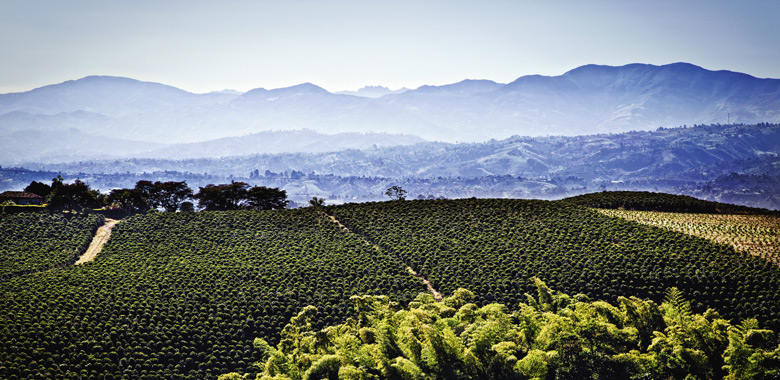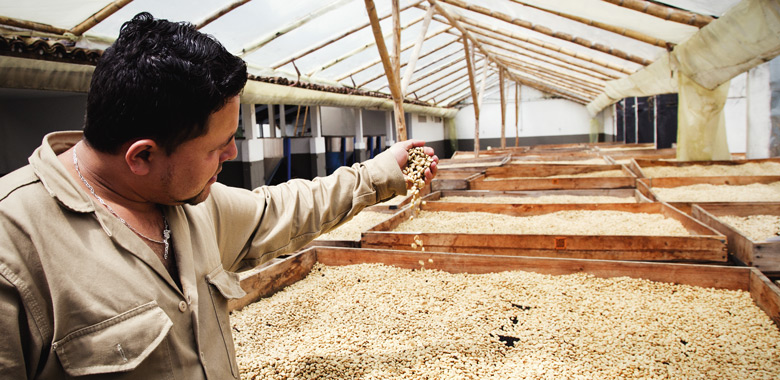
Life
Colombia's Coffee Revolution
As we survey María del Carmen Toro’s fertile coffee, banana and avocado farm, the sun has started to lower and mist is slowly gathering in the valley.
“The conflict was intense here,” she recalls. “Bombs went off all the time and ‘they’d’ come here at 1am, demanding we prepare them food.”
The ‘they’ to which she refers are Revolutionary Armed Forces of Colombia (Farc) rebels, and ‘before’ was the vicious civil war the Farc unleashed for 53 years until reaching an agreement with the Colombian government to down weapons in November, 2016.
It seems impossible to imagine that seven months earlier, I wouldn’t have met María del Carmen at La Puentecita, her tranquil one-hectare organic finca near Piendamó in the department of Cauca. Farc blockades would have stopped me even driving down the dirt track leading to the farm. This was their territory.

.jpg)
It’s time for peace now, and coffee is one of the tools in making this delicate accord a reality for Cauca, Colombia’s fourth-largest coffee cherry producing department. Besides giving up their weapons, part of the deal was that former rebels were to close down secret rural camps and transfer to one of three United Nations-managed demobilisation zones.
In a bid to integrate them into society – and it’s not a return, given many joined Farc as child soldiers and have never known a conventional lifestyle – several organisations have joined forces.

A new future
A winding two-hour drive south of Cali through the Cauca Valley, Tecnicafé coffee industrial park has taken on a new temporary role as a growers’ school. Its students are 30 former Farc rebels, selected out of 120 candidates to take part in the pilot three-month training course.
Meeting them is shrouded in mystery. Schedules were changed several times, would they come to us or would we visit the UN peace camp? It turns out that the local community wasn’t largely aware of the students’ presence, so in order to ensure their safety, we went to the coffee park. Peace is a delicate process.
Backed by Colombia’s National Learning Service (Sena), National Federation of Coffee Growers (FNC), Illy Caffè and its local supplier Ascafé, many of the participants are positive about the changes this scheme might bring. Besides agronomy, there’s a focus on barista skills, which 28-year-old Jhon Benavides relishes.
Carefully weighing out and grinding arabica beans to make me a fresh and fruity Chemex brew, the father of two, who joined Farc as a 14-year-old, says, “It seemed a good idea to join this programme, as I knew a bit about coffee growing, but wanted to learn more. Now, I want to be a great barista and carry on studying. I want the best for my family and my community. I want to make Colombia different.”
His positive attitude extends to the scheme’s organisers, too. Carlos López from Ascafé says, “It’s very new, but this is historic. We’re giving them the knowledge to make quality coffee. It’s a way out from the conflict, to help these people return to their community – we have to join together so we all reap the rewards.”

Incentivising change
While the path is long – and swapping coca for coffee production will be less lucrative – there are incentives en route. Besides acquiring expertise, graduates will receive an eight-million-peso government stipend (A$3,580) for completing the course (unknown to them when they started), as well as a guarantee from Illy that they will buy their beans at fair trade prices.
This isn’t the only scheme the Illy family is involved with in Colombia. Coffee grower ambassador Anna Illy has been visiting the country for over two decades. “I’ve been meeting our suppliers for years, but only ever in Bogotá. They would never let me come out into the field, but that’s all changing now.”
She has a particular connection with María del Carmén, who, despite the violence, set up two female coffee growers’ co-operatives in 2013 to lead 3,000 members around Piendamó. Illy not only buys from Aslicafés and MyCafé co-ops, but also guides workshops with Spanish-speaking Italian agronomists to continue empowering these women.
One change María del Carmen has made since buying her farm 13 years ago is taking it organic. “I used to have Caturra coffee plants,” she says, “but that species needs a lot of chemical treatments. Now I just grow Castillo and only use organic fertilisers. We need to think of our children’s future, too.”

Peaceful resilience
Forging ahead is key and another co-op Illy buys from is Asodesam, whose 80 members are survivors of Farc-laid landmines. Coffee picker Wilmer Galindez tells me his horribly ironic story. “I used to be a coca leaf picker, a well-paid job, earning between 700 and 1,000 Colombian pesos (A$0.30 and A$0.44) a kilo; a kilo of coffee paid 300 pesos. I’d earn 90,000 pesos (A$39.50) a day picking coca, whereas coffee would have paid 35,000 pesos. But, after deciding to move on from illicit crops, I had an accident. That was in 2010.”
Despite losing his right foot, today he holds the accolade of Asodesam’s best picker, even crafting his own prosthesis to help traverse the hilly plantations.
Forgiveness is also key, according to Asodesam president and landmine survivor, Don Adelmo. “It’s a good idea that these former guerrillas are learning to become cafeteros. We’ve all made mistakes, but the fact they’ve taken the decision to lay down their weapons and continue life in peace makes us happy.”
Gazing down at her Castillo plants and avocado trees, María del Carmen briefly reflects on the past. “We used to hear bombs going off all the time. But life’s changed. We can call it peace.”